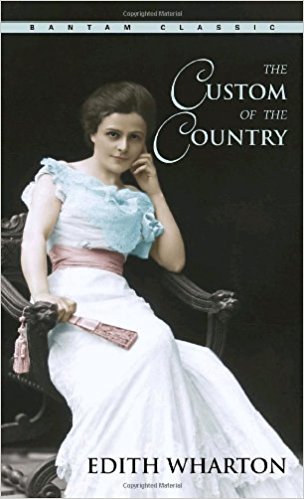The Custom of the Country by Edith Wharton
The Custom of the Country by Edith Wharton (1913) is the story of Undine Spragg, an ambitious, yet naïve young woman from the American midwest. Raised in the fictional town of Apex, and the product of a family who has risen to a certain financial status through sketchy financial dealings. She strives to rise into New York City society through a succession of marriages and divorces that ultimately lead to her undoing.
Undine Spragg has often been compared to Becky Sharp, the heroine (so to speak) of Vanity Fair by William Makepeace Thackeray, minus any of the charm. It has occasionally been supposed whether Edith Wharton, though a woman herself, was a misogyynist. Though The Custom of the Country has been more favorably viewed through the long lens of literary history, its main character, like so many other of Wharton’s fictional females, was devoid of any redeeming qualities.
Though Wharton was considered a significant literary figure from the time her first novel, The House of Mirth (1905) was published, reviewers occasionally expressed their disappointment at her subjects and characters, even as they admired her talent. Here is one such view of The Custom of the Country that appeared when the novel was published in 1913:
From the original Louisville Courier-Journal review of The Custom of the Country by Edith Wharton, November 1913: Despite its many excellent points, Mrs. Wharton’s new novel, The Custom of the Country, makes one again regret that a writer of such brilliance, such insight, such worldly wisdom, should waste time on some of the material she employs. In the America of today — bad as it is, in perhaps acute and ugly stages of transition — her pen could surely find a more significant field for analysis, could discover social processes far more deserving of notation.
Even as Lily Bart of The House of Mirth was a heroine descending the social stairs, so Undine Spragg of this present novel is that pitiable creature, a social climber, making her way up society’s beanstalk.
Insatiable egotism
A direct route to Paradise seemed that ladder when viewed from Undine’s place of upbringing, town called, ironically, Apex. Undine’s history and character is interpreted by Mrs. Wharton as the result of “the custom of the country” which develops insatiable egotism in its vain, beautiful women. Undine Spragg’s beauty and ambition were abetted to the utmost by the money of her excellently portrayed father, Abner Spragg, lift her out of her place of birth and its crude bourgeoisie, into New York’s sacred circles of old families, and eventually into an aristocratic French tribe.
With her trained powers of analysis and presentation, Mrs. Wharton deftly portrays the various social groups of Undine’s remarkable transit. The Apex crowd, the dignified New York circle, the French family with its traditional solidarity and ideals. A flawless realism depicts Undine Spragg with all her ineradicable crudities, her vanity, egotism, feeling for beauty of a material order. Her progress — or descent — is logical in a fearfully veracious manner.
Is the story worth 600 pages?
In fact, with the truth of the novel and its technical excellence, perhaps no fault at all may be found. But thus all the more glaring is the disparity between such successful presentation and the thing portrayed. Certainly the vain, crude, self-indulgent Udine Spragg and those like her, and their foolish, gullible fathers, their assortment of husbands abound in America today.
But after all, are their vulgar careers worth 600 pages from the pen of one of the country’s most gifted fiction writers? To beg the question, perhaps so. There may be a mode of treating such social phenomena, true types of the epoch, of employing them in a significant story.
The Custom of the Country on Amazon
With a far worse specimen, Thackeray immortalized an unscrupulous social adventuress. Ah, but in Becky Sharp (of Vanity Fair) and in the author’s point of view — his creative mood, so to speak — there were advantages. Becky, though devilish, could be so interesting. And Thackeray saw her in that light of true, if terrible satire, of exquisite irony which lifts a portrayal to the plane of notable art.
Mrs. Wharton’s irony savors rather of sarcasm. Her portrayal seldom achieves that fine satire, that humor of pathos distinguishing momentous novels.
More about The Custom of the Country by Edith Wharton
Wikipedia
Reading Guide to The Custom of the Country
Reader discussion on Goodreads
Read online at Project Gutenberg
Audio version on Librivox
Contemporary review on Vulpes Libris
*This post contains affiliate links. If the product is purchased by linking through, The Literary Ladies Guide receives a modest commission, which helps maintain our site and helps it to continue growing!
The post The Custom of the Country by Edith Wharton appeared first on Literary Ladies Guide to the Writing Life.




